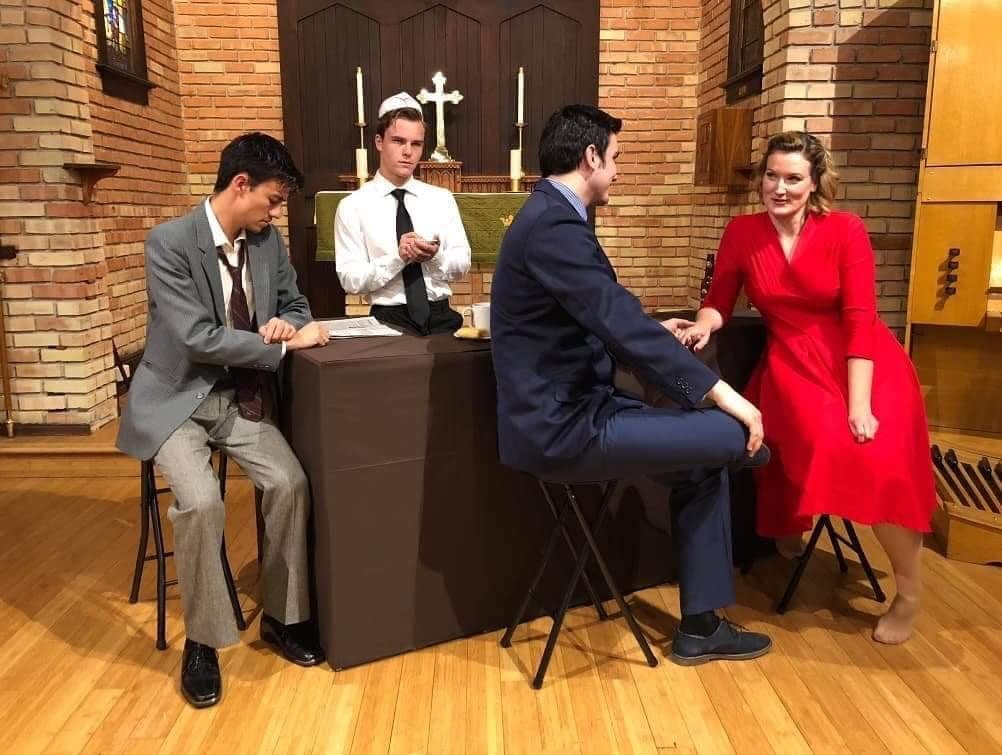PROVO — As soon as one enters St. Mary’s Episcopal Church, scene of the workshop production of Spicer W. Carr’s Nighthawks, the title clicks. The play is going to give the backstory (or a backstory) for Edward Hopper’s iconic 1942 painting of that name. Carr is responsible for all three, music, book and lyrics.
It turns out that Nighthawks is the second in a projected trilogy of one-act plays devoted to exploring personal relationships: how they begin, develop, and end. The plays will each spring from an iconic American painting. Christina’s World, a 1948 painting by Andrew Wyeth, will tell how relationships begin. American Gothic, inspired by Grant Wood’s 1930 painting of the same title, will show how relationships end. All three of these paintings are well-known to the American public, and have been incorporated into countless other works of American culture, ranging from the film Oblivion to The Adventures of Tintin to The Rocky Horror Picture Show.
Nighthawks begins with a framing encounter, as befits a painting. The Actress, played by Kynsie Kiggins, seeks shelter (perhaps symbolically as well as physically) from a rainstorm and a broken heel in a church manned by a snarky priest (played by Tyler Scott Mitchell). While he fixes her heel, she tells him her story, not exactly as part of confession, but close. As she relates the story, it is acted out at the diner set, based on the painting. The Writer (played by Brennan Newkirk), persuades the Server (played by Bailey King) to keep the diner open so that the Actress and the Banker, her boyfriend, can get a bite to eat after her play. The Banker intends to use this opportunity to propose marriage. But it turns out that The Writer and The Actress have a history, which comes out (but not all that clearly) in a series of scenes showing a love triangle.
This production represents a stage in the evolution of this specific play, and of the overall trilogy. There is plenty of promise to justify continued work. The music in particular was engaging and pleasing, varying from ballads like “You Remind Me of Someone” and “Falling in Love With You” to driving numbers like “The Party in Miami,” and an early Banker/Writer duet, with a Sondheim-inspired force and immediacy. (Note that there were no titles for the songs in the program, so I’m improvising in naming them.)
It was very evident that the cast consisted of actors singing, rather than singers acting. Not that the voices were terrible, but they were untrained, and given the power of the piano accompaniment (provided impeccably by Dallin Baldwin) and a sound-eating stage space, the performers were often simply inaudible. Music director Carlee Baldwin has work to do in that department. Singers also simply have to remember to “cheat out” so that their voices don’t disappear.
On the other hand, there are some advantages to inaudibility, judging from some of the lyrics that did come thru. Some of them were often sappy, repetitive, and mismatched to the music line. More work to be done there!
Adapting the sanctuary of a church to a workable acting space present considerable challenges, and for the most part Director Rhani Alam meets them. The cuts back and forth from the frame to the picture were always clear, though the use of “freezes” for actors not actually in the working scene was not consistent, and sometimes distracting in long scenes. (How long can that Priest sit there with his left ankle on his right knee?) The stained glass windows and other religious iconography couldn’t be taken down, and if they were slightly out of place in a deserted city street, perhaps they served to remind the audience that we were overhearing a woman’s confession.
As a workshop production, Nighthawks is a lot of fun, and there are “talkbacks” after each performance, where audience members can ask questions and give feedback, thus influencing the development of a work of art. Take advantage.
[box]Nighthawks played June 29-30, 2018, in St. Mary’s Episcopal Church (50 West 200 North, Provo).[/box]
Donate to Utah Theatre Bloggers Association today and help support theatre criticism in Utah. Our staff work hard to be an independent voice in our arts community. Currently, our goal is to pay our reviewers and editors. UTBA is a non-profit organization, and your donation is fully tax deductible.
